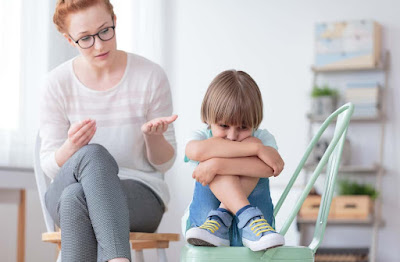Stigma associated with childhood depression is a
significant concern that can have detrimental effects on a child's mental
health and overall well-being. Stigma refers to negative attitudes, beliefs,
stereotypes, and discrimination directed toward individuals who have a
particular characteristic or condition, in this case, children with depression.
This stigma can arise from various sources, including peers, family members,
educators, and even within the healthcare system.
Effects
Stigma associated with childhood depression can be
particularly harmful. Children with depression may feel ashamed and
embarrassed, which can lead to social isolation and further negative effects on
mental health.
Stigma can also prevent parents from seeking help for their child's depression,
leading to delayed treatment and negative consequences.
Here are some ways in which stigma can affect childhood
depression and mental health:
1. Delayed
or Inadequate Treatment: Stigma can prevent parents, caregivers, and even
healthcare professionals from recognizing the signs of depression in children
or seeking appropriate help. Fear of judgment or labeling may lead to delayed
or inadequate treatment, which can worsen the child's condition and impair
their ability to cope with their emotions.
2. Social
Isolation: Stigma can lead to social isolation for children with
depression. They may be ostracized or avoided by peers and friends due to
misconceptions about mental health conditions. This isolation can exacerbate
feelings of loneliness and contribute to a sense of being different or
unworthy.
3. Internalized
Stigma: Children experiencing depression may internalize the negative
beliefs and attitudes associated with mental health conditions. This
self-stigma can lead to feelings of shame, low self-esteem, and a reluctance to
seek help or talk about their feelings.
4. Impact
on Academic Performance: Childhood depression can affect a child's academic
performance due to difficulties in concentrating, lack of motivation, and
absenteeism. Stigma-related stress and fear of being judged can further hinder
their ability to focus and succeed in school.
5. Barriers
to Seeking Help: Stigma can create significant barriers to seeking help for
both children and their families. The fear of being judged or labeled as
"weak" or "flawed" can prevent individuals from reaching
out for professional support, leading to a lack of early intervention and
appropriate treatment.
6. Negative
Coping Mechanisms: Stigmatization and the internalization of negative
beliefs can lead children with depression to engage in unhealthy coping
mechanisms. They may turn to substance abuse, self-harm, or other risky
behaviors as a way to manage their distress, which can further worsen their mental
health.
7. Limited
Support Systems: Stigma can impact a child's support system, as some
friends and family members may distance themselves or lack understanding about
the challenges of living with depression. This lack of support can further
isolate the child and hinder their recovery process.
Addressing stigma associated with childhood depression is
crucial to promote better mental health outcomes for affected children.
Creating awareness, education, and empathy around mental health conditions can
help challenge misconceptions and reduce stigma. Encouraging open discussions
and providing a supportive environment can make it easier for children to seek
help and talk about their feelings without fear of judgment.
Early intervention, access to mental health services, and
destigmatizing conversations around mental health can contribute to better
outcomes for children living with depression and help foster a more
compassionate and understanding society.
Combat Stigma
It's essential to combat stigma and promote mental health. Here are some ways
to do so:
1.
Educate yourself: Educate yourself about
childhood depression and its symptoms to reduce the stigma and promote
understanding.
2.
Speak out: Speak out against stigma and
discrimination towards mental health.
3.
Get involved: Get involved in mental health
advocacy and support organizations.
By promoting understanding and taking action against
stigma, we can create a more accepting and supportive environment for children
and families affected by childhood depression. Childhood depression can be a
challenging and overwhelming experience for children and families. However,
with the right support and treatment, it is a treatable condition. By
understanding the symptoms, causes, and effective treatment strategies for
childhood depression, parents, educators, and healthcare providers can play a
crucial role in promoting the emotional well-being of children. With the right
care and support, children with depression can recover, build resilience, and
lead fulfilling lives.

